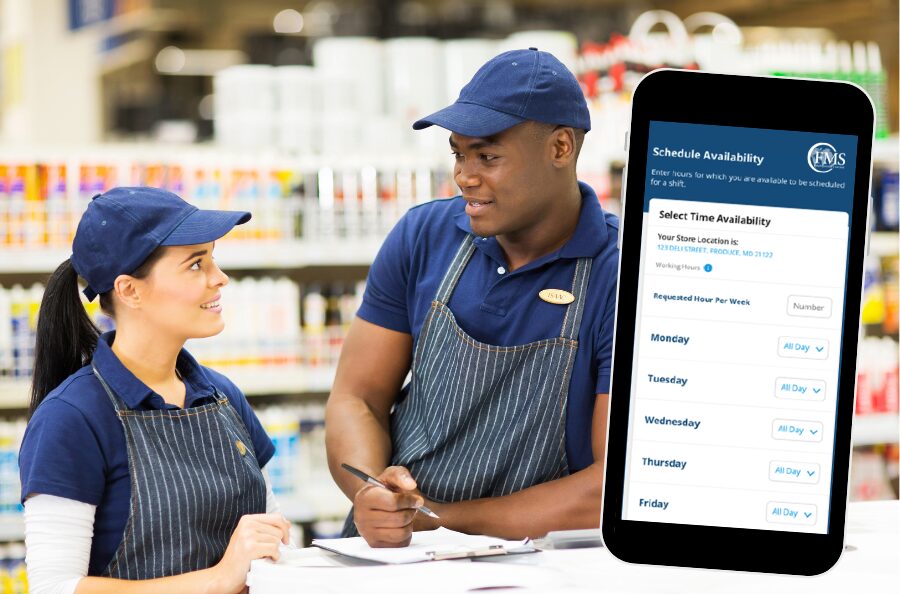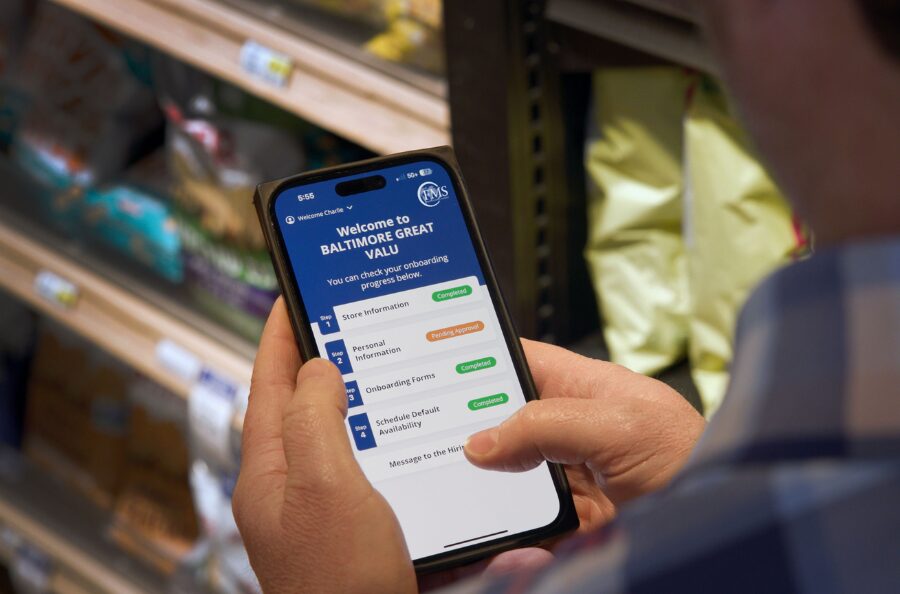
How independent grocers are tackling today’s toughest labor challenges.
Matt Scheelar has spent over a decade in the grocery industry and knows what it takes to build and maintain a strong team. As director of solutions engineering at FMS Solutions, he’s helped independent grocers across the country tackle staffing challenges head-on.

As turnover stays high and labor pressure grows, independent retailers are rethinking how they manage their teams. Scheelar shares how smarter scheduling, clearer communication and employee-focused tools like FMS’ Workhappy app are helping grocers boost retention and run more efficient stores.
Q: Matt, what’s the current state of the grocery workforce, especially for independent retailers?
Scheelar: It’s tough right now. Labor shortages aren’t new, but they’ve intensified. Independent grocers often can’t compete on wages alone, so they’re seeing high turnover – especially among younger workers who expect more flexibility and better communication. Many stores are still managing teams with paper schedules, group texts and outdated tools. That’s frustrating for both managers and employees. The stores that are winning are the ones focused on improving the day-to-day experience for their teams.
Q: Scheduling seems to be a constant headache – why does it cause so many problems?
Scheelar: Scheduling is one of the top reasons grocery employees leave. If you’re constantly getting your schedule last-minute or can’t swap shifts easily, you’re going to look for a job that respects your time. On the manager side, spending hours juggling requests and no-shows is exhausting. Smarter scheduling – especially through mobile-friendly platforms – lets employees manage their shifts and helps managers fill gaps without panic. It’s not just about coverage – it’s about control and fairness.

Q: Communication is another major challenge. What are independent grocers missing?
Scheelar: A lot of stores rely on hallway conversations, printed notes in the breakroom or group chats that are easy to ignore. Next thing you know, people are missing shifts and nobody knows what’s going on. Employees want clarity – when they’re working, what’s expected and how they’re doing. Real-time, direct communication that’s accessible on their phones helps eliminate the noise. If your staff can’t get answers quickly or feel like they’re out of the loop, you’ll lose them.
Q: What does employee engagement look like in grocery – and why should it matter to owners?
Scheelar: When your team’s engaged, they show up, they do the job right and they actually care about the place. That starts with feeling respected, heard and connected. When employees know their work matters and feel like part of a team, productivity and service improve – and turnover drops. Recognition, even simple “good job” messages or letting someone pick up a preferred shift, goes a long way. It’s not just “nice to have”– engagement is why good employees stick around.

Q: What can grocers do today to start improving retention and performance?
Scheelar: Step one? Take a hard look at how things run. Are you making it easy – or just making it through the week?
Start by:
- Reviewing your scheduling approach – can people swap shifts without a hassle?
- Creating open communication channels with your team.
- Asking employees what’s working and what’s not.
- Giving managers tools that save time and reduce stress.
Culture plays a big role too. When leadership is consistent and supportive, people tend to stay longer.
Q: How does technology like Workhappy help grocers put these strategies into action?
Scheelar: This is where tech becomes a real game changer. Workhappy was built with the grocery workforce in mind. It brings scheduling, communication and engagement into one simple app – so nothing gets lost, and everyone stays connected.
Workhappy lets your team:
- View and manage schedules from their phone.
- Swap shifts with approvals built in.
- Get updates and messages instantly.
- Receive recognition and feedback directly in the app.
Managers save time, reduce errors and get better visibility into team performance. It’s an easy win – especially for smaller operations that don’t have a big HR team or IT department.
The labor challenges facing independent grocers aren’t going away – but with the right strategies and tools, they’re manageable. Good people are hard to find – and even harder to keep. Workhappy gives you a real shot at holding onto them.

About the author
With more than 11 years of experience at FMS, Matt Scheelar has developed deep expertise across operations, installations and sales. He has played a key role in ensuring smooth project execution, managing client relationships and driving sales growth. Throughout his career, he has demonstrated strong problem-solving and communication skills, consistently contributing to the company’s success.
A graduate of Gonzaga University, Scheelar brings a solid foundation in leadership and teamwork that continues to guide his professional journey. Based in Salem, Oregon, he remains dedicated to delivering high-quality solutions and building lasting partnerships within the grocery industry.
[RELATED: Winning the Shrink Battle – How Independent Grocers Can Maximize Their Margins]


